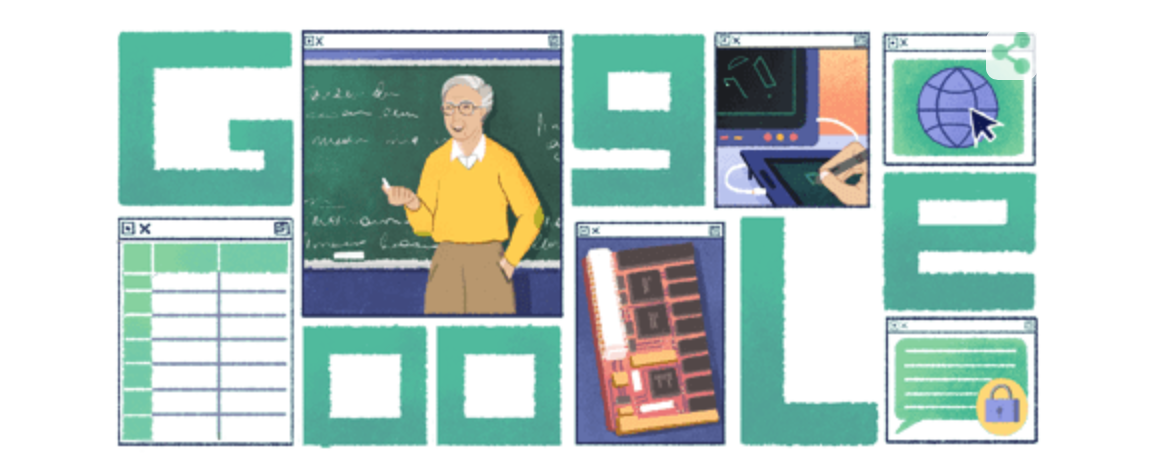Google Doodle: who is Michael Dertouzos?
The Greek professor would have celebrated his 82nd birthday today

A free daily email with the biggest news stories of the day – and the best features from TheWeek.com
You are now subscribed
Your newsletter sign-up was successful
Google users may have spotted a new Doodle today that celebrates the life of the Greek computer scientist Michael Dertouzos.
The scientist, who would be 82 today had he not died 17 years ago, is best known for predicting in 1976 that there would be a personal computer in one of every three homes by the mid-1990s, the Mirror reports.
Born in Athens on 5 November 1934, Dertouzos was the son of an admiral in the Greek navy, the newspaper says. His mother was a concert pianist. He studied at Athens College and the University of Arkansas before earning a PhD from the Massachusetts Institute of Technology (MIT).
The Week
Escape your echo chamber. Get the facts behind the news, plus analysis from multiple perspectives.

Sign up for The Week's Free Newsletters
From our morning news briefing to a weekly Good News Newsletter, get the best of The Week delivered directly to your inbox.
From our morning news briefing to a weekly Good News Newsletter, get the best of The Week delivered directly to your inbox.
After joining the university’s faculty in 1964, Dertouzos helped MIT’s Laboratory for Computer Science (LCS) develop “RSA encryption”, a technology that has become vital in sending messages across the internet more securely, says CNN.
Under the Greek professor’s leadership, LCS became “one of the largest research labs at MIT” and the American home of the World Wide Web Consortium, an international standards organisation for the internet, according to the US broadcaster. This was partly thanks to Dertouzos recruiting Sir Tim Berners-Lee, the inventor of the web, to run the consortium.
Following Dertouzos’s death on 27 August 2001, Berners-Lee said there probably wouldn’t have been a World Wide Web Consortium without him, the US broadcaster reports.
The internet’s key supporter
A free daily email with the biggest news stories of the day – and the best features from TheWeek.com
The Independent believes that Dertouzos, who played a part in developing core web technologies, will be “remembered most” as a key supporter of the internet at a time when web giants such as Amazon and Google were still in their infancy.
In his 1997 book What Will Be: How the New World of Information Will Change Our Lives he successfully predicted that the web would become an “Information Marketplace where people and their computers will buy, sell and freely exchange information and information work.”
Dertouzos believed everyone should have the right to access the internet. In 2001 he spearheaded a campaign with MIT’s Artificial Intelligence Lab to research technologies that would benefit humanity, The Independent says.
-
 At least 8 dead in California’s deadliest avalanche
At least 8 dead in California’s deadliest avalancheSpeed Read The avalanche near Lake Tahoe was the deadliest in modern California history and the worst in the US since 1981
-
 Political cartoons for February 19
Political cartoons for February 19Cartoons Thursday’s political cartoons include a suspicious package, a piece of the cake, and more
-
 The Gallivant: style and charm steps from Camber Sands
The Gallivant: style and charm steps from Camber SandsThe Week Recommends Nestled behind the dunes, this luxury hotel is a great place to hunker down and get cosy
-
 Will AI kill the smartphone?
Will AI kill the smartphone?In The Spotlight OpenAI and Meta want to unseat the ‘Lennon and McCartney’ of the gadget era
-
 Has Google burst the Nvidia bubble?
Has Google burst the Nvidia bubble?Today’s Big Question The world’s most valuable company faces a challenge from Google, as companies eye up ‘more specialised’ and ‘less power-hungry’ alternatives
-
 How the online world relies on AWS cloud servers
How the online world relies on AWS cloud serversThe Explainer Chaos caused by Monday’s online outage shows that ‘when AWS sneezes, half the internet catches the flu’
-
 Is the UK government getting too close to Big Tech?
Is the UK government getting too close to Big Tech?Today’s Big Question US-UK tech pact, supported by Nvidia and OpenAI, is part of Silicon Valley drive to ‘lock in’ American AI with US allies
-
 Google: A monopoly past its prime?
Google: A monopoly past its prime?Feature Google’s antitrust case ends with a slap on the wrist as courts struggle to keep up with the tech industry’s rapid changes
-
 South Korea's divide over allowing Google Maps
South Korea's divide over allowing Google MapsTalking Points The country is one of few modern democracies where the app doesn't work
-
 Google avoids the worst in antitrust ruling
Google avoids the worst in antitrust rulingSpeed Read A federal judge rejected the government's request to break up Google
-
 Is AI killing the internet?
Is AI killing the internet?Talking Point AI-powered browsers and search engines are threatening the death of the open web